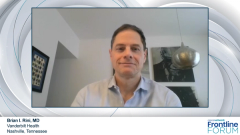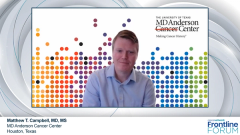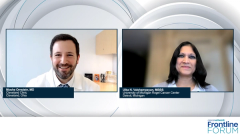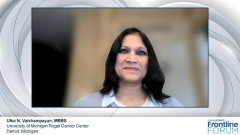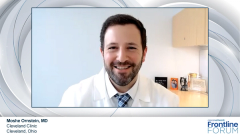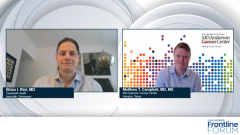
First-Line Clinical Trial Data in Advanced Renal Cell Carcinoma
A broad look at the data from several recent first-line clinical trials in the setting of advanced renal cell carcinoma and considerations for how they may impact real-world practice.
Episodes in this series

Transcript:
Brian I. Rini, MD: We were just at IKCS [International Kidney Cancer Symposium] and ESMO [European Society for Medical Oncology Congress], and there were some data updates for the phase 3 trials. Was there anything there that was meaningful or that impacted your interpretation of the data, aside from the main presentations or manuscripts?
Matthew T. Campbell, MD, MS: Yes, the longer follow-up data that we get from the CLEAR trial, which was the lenvatinib-pembrolizumab study, and the CheckMate 9ER trial are helpful in flavoring in the overall survival as we get longer follow-up. That’s giving us more confidence. One of the initial fears that I had about starting regimens with newer TKIs [tyrosine kinase inhibitors], which are so potent, is that they may have had a major influence on the ability to respond to additional therapies. That fear is going away as we’re seeing longer-term follow-ups from those studies.
I’m still impressed with the longer data that keep emerging with the CheckMate 214 trial. There’s a subset of patients that have these very durable remissions on therapy that are quite meaningful so I’m very happy that I think those 3 studies in particular are maturing very well. I’m very interested to see them with continued follow-up.
Brian I. Rini, MD: I agree. I don’t think anything major has made me change my mind about a regimen, but it’s always good to see long-term data, especially for the I/O [immuno-oncology]–TKI regimens, which were behind in terms of the timeline of accrual to ipilimumab-nivolumab and the CheckMate 214 trial. It will be interesting to see if there’s a plateau in those curves. We see a plateau in ipilimumab-nivolumab, although 1 thing I struggle with is there was a ton of censoring in ipilimumab-nivolumab. I believe 21% of patients didn’t get all 4 doses of ipilimumab. They were censored for PFS [progression-free survival] at that point, so a lot of information was lost. I quote that 30% progression-free survival at 5 years, as a lot of people do, but only 10% of patients who entered the trial had data after that time point.
Moreover, for all these data sets, we need some good data about what happens to patients long term because patients care about that. They care about those numbers. You see plenty of new patients, as I do. The questions we get are, “Doctor, how long am I going to live? What’s going to happen next year and in 5 years? Am I going to see my grandkids do this or that?” You don’t want to hedge on those answers. You’d like to give them firm answers based on multiple phase 3 trials and say, “The best data we have show this.” It’s somewhat reassuring to patients. The numbers aren’t as high as we want them to be, but I’d like to see more long-term data.
Matthew T. Campbell, MD, MS: It would be a dream for me to see extremely granular data: where a patient was enrolled and what they received after. The data we get about their story are so helpful. Maybe we can fill that in with some of the real-world experience we get from IMDC [International Metastatic Renal Cell Carcinoma Database Consortium] and some of the other big collaborations.
Brian I. Rini, MD: One thing that phase 3 trials in the front line don’t do well—I’m not being critical; it’s very difficult—is tell us what happens to patients after they stop treatment, either for progression or toxicity? That’s what we want to know. What happened to those patients? Were they off treatment for a while? Which treatment did they start? Did they respond? You and I have done a lot of trials. It’s hard to collect that data. If patients progress at your center or mine, sometimes they go back and get treatment locally. That’s not uncommon that they’re motivated up front. They’ll drive or fly for a frontline trial but then get lost in follow-up for various reasons that are understandable. I find the quality of those data, when we talk about things like PFS and subsequent therapy too—to be pretty poor.
Matthew T. Campbell, MD, MS: Agreed.
Transcript edited for clarity.
Newsletter
Stay up to date on recent advances in the multidisciplinary approach to cancer.


